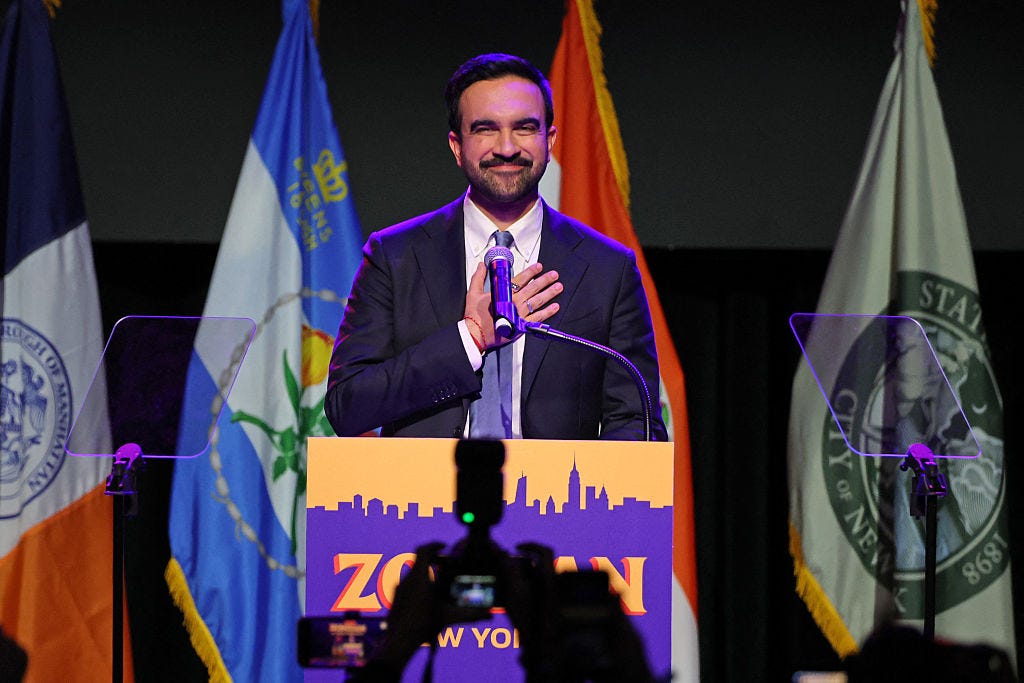Coleman Hughes: New York City’s Socialist Experiment Begins The antidote to Marxism has always been experiencing Marxism. Today, the Big Apple becomes an unwitting test subject.
If history is any guide, Marxist celebrations in New York City may be short-lived, writes Coleman Hughes. (Angela Weiss/AFP via Getty Images)
Last night, the once unimaginable happened: New York City elected a socialist as mayor. Zohran Mamdani is a member of the Democratic Socialists of America, an organization dedicated to “transforming the power relations of global capitalism.” Mamdani’s victory, and the momentum of progressive Democrats, is the latest sign that another profound shift in our politics could be underway. How did we get here? According to Coleman Hughes, you can’t answer that question without reading Thomas Sowell. Sowell, 95, is one of the world’s most influential economists and social philosophers, and has written more than 45 books. But “A Conflict of Visions: Ideological Origins of Political Struggles,” which he published in 1987, is his favorite. In it, he traces the underlying logic behind all modern political divides. Why is it that knowing someone’s position on one issue, say gun control, makes it easy to predict their position on a totally unrelated issue, like abortion? Some people would chalk it up to political tribalism. Sowell, who was a Marxist as a young man before becoming one of the most important conservative thinkers in America, argues it’s something deeper: a clash of instinctive “visions” about human nature and the limits of social engineering. “A Conflict of Visions” is the book that Coleman chose to discuss with Shilo Brooks for the latest episode of “Old School.” Their conversation—recorded well before yesterday’s election—illuminates why some of us buy into utopian projects of remaking society, while others trust the quiet power of incentive structures like free markets. We’re excited to share that episode below, along with a new essay from Coleman on Sowell, Mamdani, and the future of the American left. —The Editors  If you prefer to listen, the episode is also available on Apple and Spotify. This article is featured in U.S. Politics. Sign up here to get an update every time a new piece is published. It would seem a perfect time for Marxists to celebrate. New York City has elected a proud socialist as its mayor. But if history is any guide, the celebration may be short-lived. Across the world—from the Soviet Union to Venezuela—the antidote to Marxism has always been experiencing Marxism. Indeed, some of the fiercest and most effective critics of Marxism began as Marxists themselves. This was true, for instance, of Robert Nozick, Irving Kristol, Robert Conquest, Paul Johnson, Deirdre McCloskey, Kingsley Amis, and Eugene Genovese and Elizabeth Fox-Genovese. Of all the intellectuals that started out as collectivists only to become staunch capitalists, perhaps none is more famous than Thomas Sowell. Sowell was drawn to Karl Marx as a young man because, as he put it, the German philosopher explained so much of his “grim experience.” Sowell was born during the Great Depression in Jim Crow North Carolina. He was raised by his great-aunt in a small house on an unpaved street, where he spent his early years without hot water or electricity. As a teenager he lived for a time in a homeless shelter, sleeping with a knife under his pillow. Marxism seemed to explain why people like him had so little while others had so much...
Become a paid subscriber Get access to our comments section, special columns like TGIF and Things Worth Remembering, tickets in advance to our live events, and more. UPGRADE TODAY |



